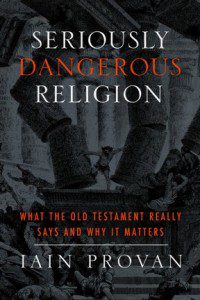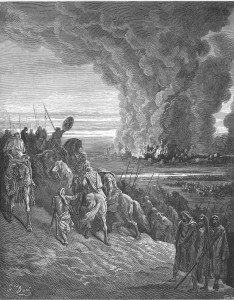 We’ve now finished Iain Provan’s book Seriously Dangerous Religion with subtitle: What the Old Testament Really Says and Why It Matters. In the postscript to his book Provan sums up his argument. There are a variety of different worldviews at play in our world each with its own particular story of the past. In this mix of stories some claim that the biblical story is an outgrown superstition, with the Old Testament focused on tribal gods and bronze age ethics and the New Testament not much better. The biblical Old Story is said to be downright dangerous. Provan counters and concludes:
We’ve now finished Iain Provan’s book Seriously Dangerous Religion with subtitle: What the Old Testament Really Says and Why It Matters. In the postscript to his book Provan sums up his argument. There are a variety of different worldviews at play in our world each with its own particular story of the past. In this mix of stories some claim that the biblical story is an outgrown superstition, with the Old Testament focused on tribal gods and bronze age ethics and the New Testament not much better. The biblical Old Story is said to be downright dangerous. Provan counters and concludes:
It is this Old Story, I propose, into which we still need to read ourselves even in these late modern or postmodern times, as many have done in earlier times if we want to understand who we are and how we ought to live. In fact, it is this Old Story that provides the most secure foundation upon which to build the better future for humankind (and for the planet) for which many of its detractors are looking. It is an Old Story that is big enough and deep enough and long enough to ground a New Age—whether that age is “axial” or not. (p. 409)
Provan’s book is excellent, and I learned much from reading it and interacting with the questions he raises. The Old Story is is big enough and deep enough and long enough to ground a our age and many ages to come.
Still important questions remain. Provan is an Old Testament scholar and his book is focused on the sweep of the Old Testament. He is particularly intent on countering the claims that the Old Testament is, quite simply, a problem. He does this with a detailed discussion of what the Bible really teaches. In some areas he did this quite well – in others, perhaps not so well. A commenter on the last post accused him of stacking the deck to make his point.
That’s cherry picking.
Let’s try a different set of questions.
Is collective punishment justified? Can we ask that question instead?
(The commenter goes on to relate this to the current Israel-Palestine conflict – see the original comment if interested.) The warfare described in Deuteronomy, Joshua, Judges, 1 Samuel can certainly raise some important questions here – as can some of the passages in the prophets calling down judgment on various people groups.
And a second comment after I made a short response to the first:
I’m working off your summation above, which seems to pitch softball questions with acceptable answers. You could interview Nixon, and if you asked the right questions, you could paint a (selective) portrait of a man that is very positive. And then you could question why people ever had a problem with him in the first place. Dawkins and others have criticized barbaric bronze-age morality in the Old Testament. If you selectively pick and choose what moral issues and examples you tackle and how, of course you can at the end of it sit back and say, “well there’s no problem to see here. Why all the criticism?”
These comments raise important points. I have some thoughts in response and welcome thoughts from others as well.
First, Dawkins and others who have criticized “barbaric bronze-age morality in the Old Testament” can be accused of cherry picking as well – this time picking the particularly bad, worm infested, rotten cherries. These passages are present – but it is also true that justice, generosity to the poor, care for the weak, the powerless, the widow, the orphan, and the foreigner among you runs through the Old Testament. This theme is inescapable and overwhelming – and it certainly is not “barbaric” morality, in the bronze age or any other age. It is no more justifiable to negate this ethic running through the Old Testament than it is to ignore the “problem passages.” The real shame is that so many Christians, while purporting to believe the Old Story ignore this deeply running theme.
Second, it is clearly true that people can and have used the Bible and (so-called) biblical faith to justify some pretty terrible actions. It is true of some Jewish groups in the Israel-Palestine conflict, it was true in the Spanish inquisition, and it was true in a range of executions Europe. I am sure that we can find other examples as well. Does the fact that the biblical story has been used in this fashion make it intrinsically dangerous? The question can be looked at in the context of many similar questions. Is evolutionary biology dangerous because it was/is used to justify eugenics? Is Capitalism dangerous because it has been used to justify oppression? It is not enough to point to specific incidents to declare an idea of any sort intrinsically dangerous. Humans are good at twisting things to nefarious ends.
However, valid case can be made that The Old Story is intrinsically dangerous if it actively teaches and encourages violence and warfare. There is an important question to be addressed then, regarding the nature of the Old Story. Here I agree with the criticism of Provan’s approach to some extent. While I don’t think he cherry-picks the positive, I do think he avoids many of the hardball questions and gives less than satisfactory answers to others.
Provan suggests that some of the features of the Old Testament are accommodations to the bronze age ancient Near Eastern culture in which the original hearers/readers lived and/or to the reality of broken human relationships. Support for such an approach is found, for example, in the response Jesus gave concerning divorce “Moses permitted you to divorce your wives because your hearts were hard. But it was not this way from the beginning.” Polygamy, concubines, and many of the specific laws enumerated in Leviticus may fall into similar categories … not so much “because your hearts were hard” but because this was how the local culture functioned. The overriding theme is holiness rather than the details of practice … this applies to defiling skin diseases and defiling molds and practices in sacrifice and many more. The Old Story is not a long list of precise commands for all time, but is summed up as Jesus said, love the Lord your God with heart, mind, soul, and strength and love your neighbor as yourself.
 But this still leaves the herem warfare of Deuteronomy, Joshua and 1 Samuel to be reckoned with … which gets to the heart of the first challenge above. Provan gives a brief suggestion that this warfare was justified by the immorality of the Canaanites and others, but doesn’t really dig into this issue in any satisfactory manner. In chapter 3, addressing the question “who is God?” Provan responds to one of Richard Dawkins’ critiques:
But this still leaves the herem warfare of Deuteronomy, Joshua and 1 Samuel to be reckoned with … which gets to the heart of the first challenge above. Provan gives a brief suggestion that this warfare was justified by the immorality of the Canaanites and others, but doesn’t really dig into this issue in any satisfactory manner. In chapter 3, addressing the question “who is God?” Provan responds to one of Richard Dawkins’ critiques:
The Joshua narratives concern, precisely, the long-overdue judgment of a patient and merciful God on “jubilant” but corrupt human culture.46 They have nothing to do with the kind of imperialistic conquest or ethnic cleansing that Dawkins’ modern examples evoke. There is no idea in biblical literature that the Israelites had any “right” to the land of Canaan.47 Nor has ethnicity anything to do with what happens, in this literature, to the Canaanites. They are driven out of the land (to the extent that they are driven out)48 because they are wicked—just as the Israelites themselves are later driven out of the same land, for the same reason.49 The Joshua narratives are, in the end, one kind of answer to the question of Psalm 94 (“how long?”)— a persistent, biblical question.50 How long will injustice be allowed to stalk the earth; how long will the cries of the oppressed go unheard? Even-handed justice lies at the heart of the matter—as it typically does, when biblical authors (and sometimes biblical characters) describe or reflect upon war. (p. 71)
The endnotes attached to this section are long – sometimes useful, other times less so. Note 47 provides a useful discussion of the promised land as a gift from God. Note 48 points out that the narrative uses hyperbolic language and it is clear that the conquest was not as complete as some passages of Deuteronomy and Joshua (e.g. Joshua 10) make it seem. Provan concludes the note, “It seems, in fact, that we are dealing here with hyperbolic language that is fairly typical of ancient Near Eastern conquest accounts and that we should not interpret it as claiming anything more than that Joshua won comprehensive military victories.” (p. 420) This is an important point and one we need to recognize. On the other hand, notes 46 and 49 emphasize the “just” nature of God’s wrath and the guilt of the Canaanites and later the Israelites. I find Provan’s comments on this “justification”, frankly, far less convincing and the conclusions drawn from this line of reasoning can be and has been dangerous at times.
Does the the Old Story, the biblical story, teach or even allow that we as God’s people should be the arms of his wrath and vengeance?
Within certain beliefs of the nature of scripture – particular views of inerrancy and infallibility – I don’t think there is any satisfactory solution to the problem of Joshua.
Still consistent with the truthfulness and authority of scripture there are, perhaps, some solutions worth considering.
It seems as though the language is hyperbolic and the reality less devastating. The Old Testament itself belies the total destruction of the Canaanites or any of the rest of Israel’s foes. The language may reflect a literary genre and style of the culture that we do not completely appreciate.
There is a clear trajectory in the Old Testament that talks about each generation suffering the consequences of its own sin. The sins of the fathers will not be held against the sons. Such should guide our actions (as should the love of our enemies commanded by Jesus). Herem warfare is not the norm in the biblical story.
It seems possible that the way in which the story is told could reflect a wish that everything likely to contaminate Israel religiously had been utterly destroyed – as though this would have kept them from following a path of destruction. If the text was edited into the form we have it in the exilic and post-exilic period this should, perhaps, be considered.
Not everything related in the Old Testament is actually good – it is simply what happened. It can and does reflect the ancient Near Eastern bronze age culture and the real emotions or real people. God works through deep failings and with both insiders and outsiders.
All of these points could be discussed in much more detail.
Most importantly – we need to read and consider the whole sweep of the Old Testament, and neither fixate too strongly on problem passages or brush them carelessly under the rug. I don’t think that the biblical story teaches or even allows that we as God’s people should be the agents of his wrath. We are not called to purify the land or to establish a holy kingdom by force. I don’t think that the Old Testament teaches this, or even teaches that Israel was called to do this. Israel was called to love the Lord their God and worship him alone and to act in an ethic most of us would admire – He has shown you, O mortal, what is good. And what does the Lord require of you? To act justly and to love mercy and to walk humbly with your God. (Micah 6:8)
Is the Old Story dangerous?
Why is the biblical faith for our age good news?
If you wish to contact me, you may do so at rjs4mail[at]att.net.
If interested you can subscribe to a full text feed of my posts at Musings on Science and Theology.
















